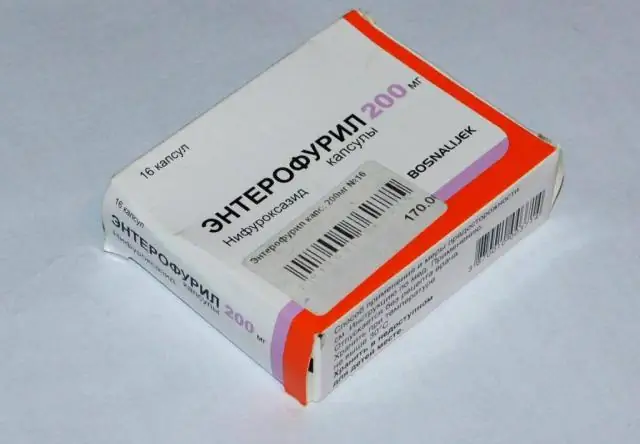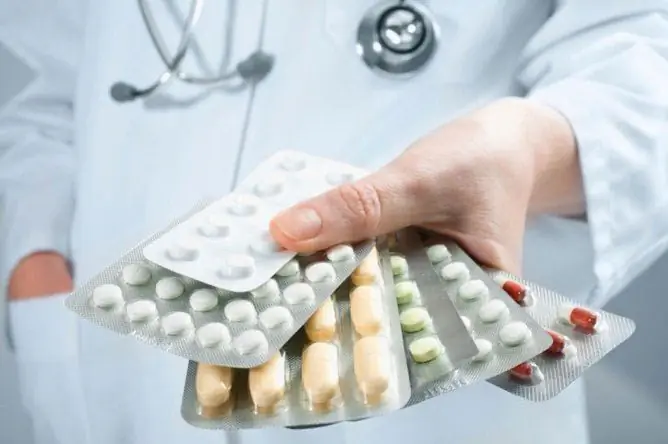- Author Rachel Wainwright [email protected].
- Public 2023-12-15 07:39.
- Last modified 2025-11-02 20:14.
Bilobil
Bilobil: instructions for use and reviews
- 1. Release form and composition
- 2. Pharmacodynamics and pharmacokinetics
- 3. Indications for use
- 4. Contraindications
- 5. Method of application and dosage
- 6. Side effects
- 7. Overdose
- 8. Special instructions
- 9. Pregnancy and lactation
- 10. Drug interactions
- 11. Analogs
- 12. Terms and conditions of storage
- 13. Terms of dispensing from pharmacies
- 14. Reviews
- 15. Price in pharmacies
Latin name: Bilobil
ATX code: N06DX02
Active ingredient: Ginkgo biloba leaves extract (Ginkgo Bilobae foliorum extract)
Manufacturer: KRKA (Slovenia)
Description and photo update: 2019-06-08
Prices in pharmacies: from 189 rubles.
Buy

Bilobil is a herbal medicine that improves cerebral and peripheral blood circulation.
Release form and composition
The drug is available in capsules: lilac-brown (lid and body), gelatinous, containing a yellowish-brown powder with visible darker blotches (in blisters of 10 pcs., In a carton pack 2, 6 or 10 blisters).
In 1 capsule:
- Active ingredient: dry extract from leaves of Ginkgo biloba - 40 mg, of which 6% (2.4 mg) are terpene lactones, 24% (9.6 mg) are flavone glycosides;
- Excipients: corn starch, colloidal silicon dioxide (anhydrous), lactose monohydrate, magnesium stearate, talc.
The gelatin capsule consists of gelatin, titanium dioxide, iron oxide red dye, azorubine dye, indigotine dye, black iron oxide dye.
Pharmacodynamics and pharmacokinetics
Bilobil is a phytopreparation that normalizes blood rheological parameters, cellular metabolism and tissue perfusion. Its use leads to an improvement in cerebral circulation and a full supply of the brain with oxygen and glucose. The drug prevents platelet activation and inhibits erythrocyte aggregation.
By varying the dose of Bilobil, the work of the vascular system can be regulated. Its active components activate the synthesis of NO, increase the tone of the veins, expand the lumen of arterioles, improving the filling of blood vessels with blood. The drug reduces the permeability of the vessel wall and is characterized by an antithrombotic effect by weakening the influence of the platelet-activating factor, affecting the biosynthesis of prostaglandins, strengthening the membranes of platelets and erythrocytes.
The drug slows down fat peroxidation of cell membranes and prevents the formation of free radicals. Also, its active substances normalize the metabolism of neurotransmitters (for example, acetylcholine, norepinephrine and dopamine), participate in the regulation of mediator processes in the brain, increase the rate of glucose and oxygen processing in the body, have an antihypoxic effect, ensure the accumulation of macroergs and activate metabolism.
After oral administration, the bioavailability of ginkgolides and bilobalide, the active components of the drug, reaches 85%. The maximum concentration of these substances is recorded 2 hours after ingestion. The half-life is 4-10 hours. The molecules of the compounds are not degraded in the body and are excreted unchanged, mainly in the urine, to a lesser extent in the feces.
Indications for use
Ginkgo biloba improves the supply of blood to the brain tissue by dilating blood vessels and improving blood flow (blood clotting decreases), regulates metabolism.
The use of the drug is recommended in the following cases:
- Cerebral circulation disorder;
- Memory impairment;
- Mental retardation;
- Anxiety states that are accompanied by isolation;
- Dizziness, tinnitus and sleep disturbances;
- Raynaud's disease;
- Other pathologies that are accompanied by impaired peripheral circulation.
Contraindications
- Reduced blood clotting;
- Erosive gastritis;
- Peptic ulcer and / or duodenal ulcer in the acute phase;
- Acute disorders of cerebral circulation;
- Acute myocardial infarction;
- Hypersensitivity to drug components.
This drug can be used for therapy in patients who are at least 18 years old.
Instructions for use of Bilobil: method and dosage
It is recommended to use Bilobil in the following dosage: 1 capsule 3 times a day with a little water.
The phytopreparation begins to show its therapeutic properties only a month after the start of the course. To maintain the long-term effect, the capsules should be taken for 3 months (this is especially true for the elderly).
Side effects
- Allergic manifestations: itching, skin flushing, swelling;
- Digestive system: diarrhea, nausea, vomiting;
- Nervous system: insomnia, headache, dizziness, hearing impairment;
- Other: decrease in hemocoagulation.
In case of undesirable symptoms, you must cancel the reception.
Overdose
There are currently no reports of overdose.
special instructions
There is no information about whether the reception of Bilobil affects the high reaction rate of a person. Therefore, drivers and people whose work requires quick reaction, it is better to refrain from taking it.
If you often have sensations of dizziness, tinnitus, partial hearing loss, you should definitely consult a doctor.
Due to the lactose contained in the capsule, Bilobil should not be prescribed to patients with glucose / galactose malabsorption syndrome, galactosemia, as well as lapp lactase deficiency.
The presence of azo dyes (E110, E124 and E151) in extremely rare cases can cause the development of bronchospasm.
Pregnancy and lactation
It is not recommended to use Bilobil during pregnancy and during breastfeeding, since there are no reliable clinical data indicating possible consequences.
Drug interactions
According to the instructions, Bilobil should not be prescribed to patients who regularly take drugs that reduce blood clotting (for example, acetylsalicylic acid and other non-steroidal anti-inflammatory drugs, direct and indirect anticoagulants). This combination can increase the risk of bleeding due to prolonged clotting time.
Analogs
Bilobil's analogs (preparations in which dry extract from the leaves of Ginkgo biloba is the main active ingredient): Vitrum Memori, Gingium, Ginos, Memoplant, Tanakan, Bilobil intensity.
Medicines of a similar action: Akatinol Memantine, Alzeim, Intellan, Memaneirin, Memantine, Memorel, Noodzheron, Memikar, Memantal, Maruksa, Memantinol, etc.
Terms and conditions of storage
Store in a cool dry place out of direct sunlight, away from children.
Storage temperature room (up to 25 ° С).
Shelf life is 2 years.
Terms of dispensing from pharmacies
Dispensed by prescription.
Reviews about Bilobil
According to reviews, Bilobil demonstrates high efficiency in improving cerebral circulation. Many doctors cite evidence that ginkgo tree extract is virtually the only cognitive-enhancing drug in elderly patients. However, studies have also shown that after discontinuation of Bilobil, patients in this category experience relapses of age-related symptoms.
Price for Bilobil in pharmacies
The price of Bilobil with a dosage of 40 mg is on average 490 rubles (for a package consisting of 60 capsules).
Bilobil: prices in online pharmacies
|
Drug name Price Pharmacy |
|
Bilobil forte 80 mg capsules 20 pcs. 189 r Buy |
|
Reviews Bilobil Forte 189 r Buy |
|
Bilobil forte capsules 80mg 20 pcs. 285 r Buy |
|
Bilobil intensity 120 120 mg capsules 20 pcs. 335 RUB Buy |
|
Bilobil Intensity 120 capsules 120mg 20 pcs. 477 r Buy |
|
Bilobil 40 mg capsules 60 pcs. RUB 524 Buy |
|
Bilobil forte 80 mg capsules 60 pcs. RUB 635 Buy |
|
Reviews Bilobil Forte RUB 635 Buy |
|
Bilobil capsules 40mg 60 pcs. 653 r Buy |
|
Bilobil forte capsules 80mg 60 pcs. 702 RUB Buy |
|
Bilobil Intensity 120 120 mg capsules 60 pcs. 988 RUB Buy |
|
Bilobil Intense 120 capsules 120mg 60 pcs. 1033 RUB Buy |
| See all offers from pharmacies |

Maria Kulkes Medical journalist About the author
Education: First Moscow State Medical University named after I. M. Sechenov, specialty "General Medicine".
Information about the drug is generalized, provided for informational purposes only and does not replace the official instructions. Self-medication is hazardous to health!






